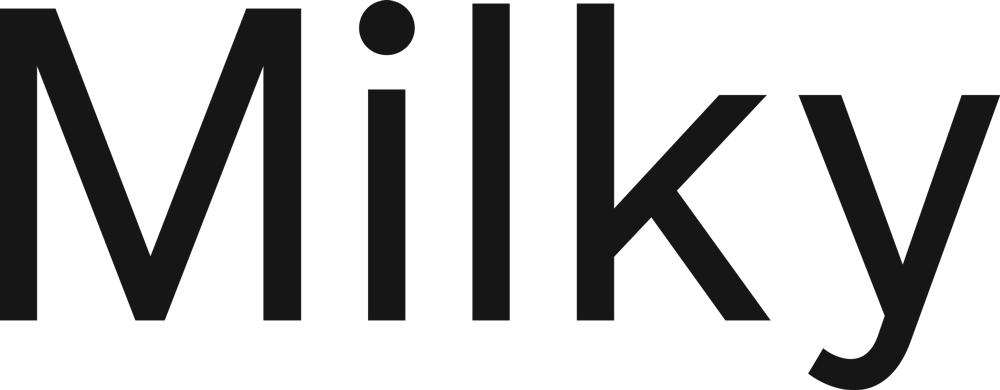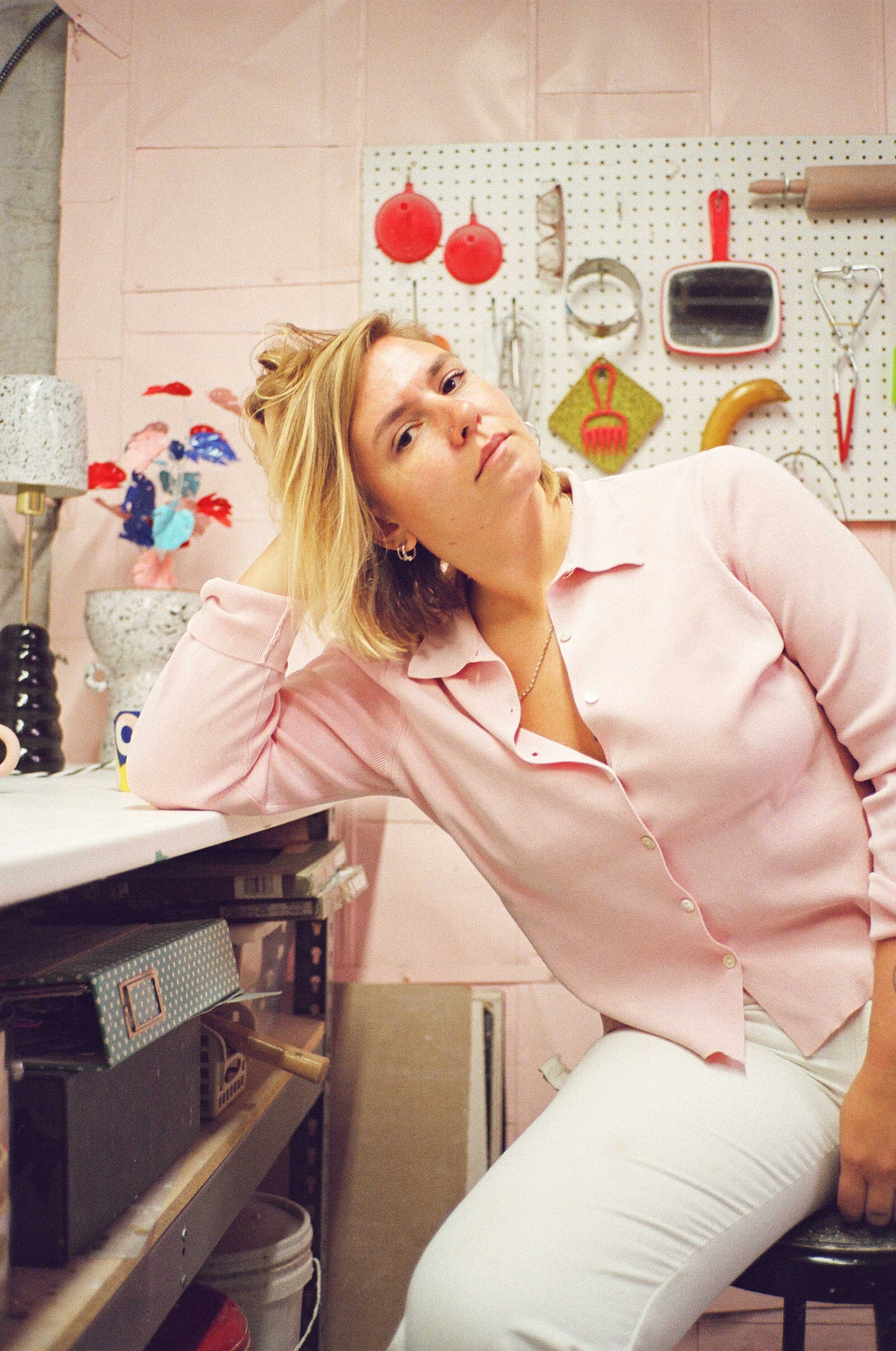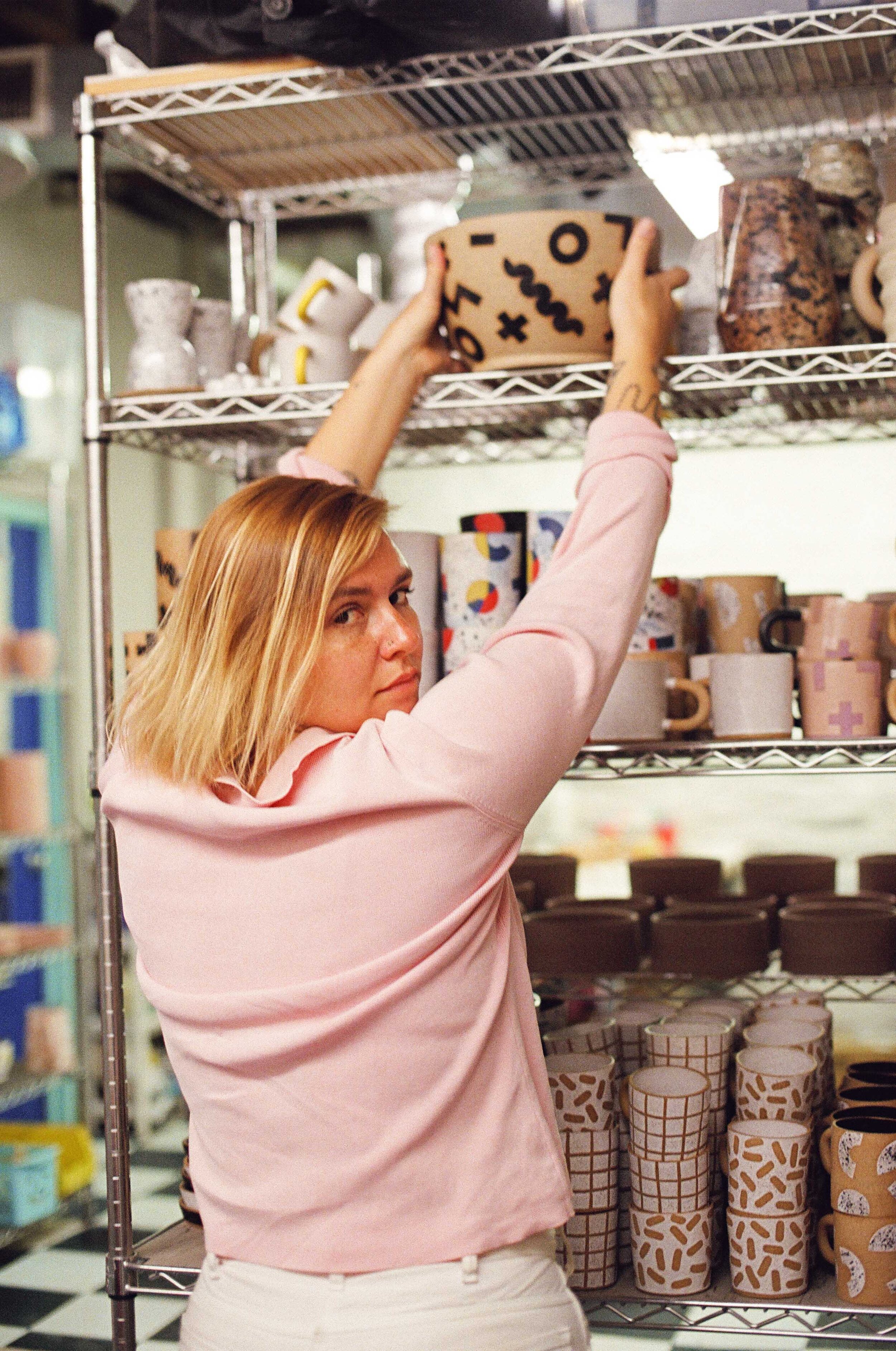WITH: Josephine Heilpern
Josephine Heilpern is the ceramicist behind Recreation Center, Brooklyn’s favorite company for cleverly patterned, highly likeable hand-thrown tableware (she makes lava lamps, too!). We met up with Josephine at her Red Hook studio to chat about her creative journey (including a modern ceramics love story) and what it really means to be a small-business owner (hot tip: it’s hard). Her advice was — true to character — friendly, honest, and wise. For all our aspiring makers and creative entrepreneurs out there: this one’s for you.
Photography by Eva Zar
TELL US A BIT ABOUT RECREATION CENTER.
I’m just a teeny, tiny ceramics brand. I started about seven years ago — maybe more than that now. It’s pretty much always been just me. I’ve had interns, and I have an employee now, but it’s a really small operation. It’s awesome, but it also means I do absolutely everything: making, glazing, packaging, dealing with customers. I carry my stuff to stores sometimes. I literally do everything.
I’m a functional ceramics brand, with an emphasis on functional. I think decorative objects are beautiful, but I like things that serve a function — especially if it’s something we do every day, like eat or drink.
HOW WOULD YOU DESCRIBE THE PERSONALITY OF THE BRAND?
It would be like describing my personality. I think that a lot of people that walk into my studio think, ‘Oh, this is Jo’s world.’ My house is like this too. I think that what I make is very much me. And I do think that’s really important.
I would say my stuff is pretty trendy. I do follow trends, and I think it’s important to do that — but this has been my style forever. I love color. To be making things that are very much me really speaks to the truth of it, and it’s not fleeting in that way.
HOW DID YOU START MAKING CERAMICS?
I went to art school, but I didn’t do ceramics in school. I graduated in 2008, so ceramics weren’t really cool then. I did printmaking and drawing — it was an interdisciplinary school so I was able to do a lot. I’ve always made things.
I went to a farm one summer that was run by another student and owned by a teacher. She did ceramics, and she taught me. After that, it took me a while to get back into it, but I retaught myself, and it was the first time making something really clicked. I saw this relationship between what I made, how it fit into my life, and what I needed it for. And then it also served as a functional object for something I really love to do: eat and cook. All these things started to make sense for me. I was going to the studio every day. I remember taking everything out of the kiln and putting it on a table, and seeing that everything made sense together. And I thought, ‘Whoa, I think that I finally feel as a whole, something that I want to do.’
THAT’S SUCH A COOL FEELING — TO HAVE SOMETHING CLICK LIKE THAT.
Yeah, amazing. When you love it, and you love doing it, and it clicks, and you feel like you understand it in this way that you don’t need to understand it — that’s such a crazy feeling.
ALMOST LIKE FINDING A PARTNER.
Yeah! I was just thinking, it’s like being in love. Somehow this just works. I don’t have to force it, I don’t have to question it — it is what it is. That’s how I felt with ceramics. It’s just natural.
“When you love it, and you love doing it, and it clicks, and you feel like you understand it in this way that you don’t need to understand it — that’s such a crazy feeling.”
on finding the work you love doing
HOW HAS YOUR RELATIONSHIP TO FOOD INFORMED WHAT YOU DO WITH RECREATION CENTER?
I think about food a lot. Food is so romantic to me. There’s nothing more nourishing, incredible, and loving than being fed by someone you love or feeding someone you love. I’ve always thought about food. It has history, it carries cultures, it connects you to people, it connects you to spaces, it’s nature. It is the way that we put nature inside of us. It’s the way that we feel, and it’s the way we’re connected to the Earth. It’s second nature: you need to eat. And it has the ability to make you feel every feeling. You can feel really happy and it can help you with depression; it can make you feel depressed. And it can make you feel overwhelmed with joy. I’ve cried over meals before.
Why not do it off of something that also makes you happy? For me, bringing these two things in unison is really powerful. I like that. I like when you can hold a bowl and it feels good in your hands. Or when you’re drinking a nice hot coffee in the morning, and you’re holding this thing that’s also really nice.
SO MANY PEOPLE PURSUING THEIR CREATIVE PASSIONS WOULD LOVE TO BRANCH OUT AND START THEIR OWN THING, WHICH YOU’VE DONE VERY SUCCESSFULLY. WHAT ADVICE WOULD YOU GIVE SOMEONE AT THAT CROSSROADS?
I think it’s hard for me to answer, because none of this was planned — it just slowly happened. Maybe that’s my advice: Just go with the flow. If you’re doing something you love to do, and it makes you feel good, and you keep doing what works, and you stop doing what doesn’t work — I think that’s really important — then I hope that you’ll get there. But it’s hard.
We have this view of businesses from the outside, and what we show to the world is very different from what exists. People think this is a big operation, but it’s just me. And the amount of work that goes into this and the amount of struggle… it’s hard to survive doing what I do. I do it because I love it, otherwise I wouldn’t. Financially, it makes absolutely no sense. I think that’s another piece of advice: Maybe it’s going to take years for it to feel financially worthwhile, but if you love doing it, and it helps you eat and survive, and you don’t feel moments of extreme distress when you’re doing it, then you’re probably doing an okay job.
WHEN YOU WERE STARTING, DID YOU HAVE ANOTHER JOB?
Yes, I had another job at Two Palms, a collaborative print studio. I was going there four days a week. After work I would go to my studio and I would work until I couldn’t work anymore, and I would work all weekend. As it started to grow I started cutting back my time at Two Palms. That was one of the lucky things with them — they were like, ‘Do what you gotta do.’
THAT’S SO GREAT.
It was never like, all of nothing. It was like, come here when you need to come in, but focus on what you’re doing. And I really took advantage of that, and as this started to grow I just cut back time there and started going to the studio more. I mean it’s hard to live fully off of this, but luckily I’ve been able to do it somehow. Sometimes I have no idea how I do it. [laughs]
I’VE RECENTLY BEEN THINKING A LOT ABOUT THE CHALLENGES THAT COME WITH WORKING ON SOMETHING THAT’S BOTH YOUR PERSONAL EXPRESSION AND A BUSINESS. DO YOU EVER FEEL PRESSURE ON THE BUSINESS SIDE OF THINGS?
Yes, I’m constantly feeling like, ‘How the hell have I made this work?’ Honestly, I’m kind of a mess when it comes to this. I’m not afraid to admit it. I don’t know how to do most things when it comes to owning a small business, whatever that means. I just do it. I’m just making things, and people are buying them, and that’s about all I can understand. It’s been working and maybe one day I’ll get better at it. It’s hard.
I THINK THAT’S THE CASE FOR SO MANY CREATIVE BUSINESS OWNERS. YOU’RE NOT COMING FROM BUSINESS SCHOOL, YOU’RE COMING FROM A PLACE OF LOVING TO MAKE SOMETHING.
Yeah, I didn’t know how to do any of this. But I think that’s what’s so cool. It all becomes a process of learning, so it’s never boring.
I ALWAYS FEEL THAT IT’S SO IMPORTANT TO CREATE TRANSPARENCY AROUND THAT, BECAUSE I KNOW HOW OVERWHELMING IT CAN BE TO TRY TO BRANCH OUT LIKE THIS, BUT TO FEEL LIKE YOU’RE A MESS, OR THAT YOU HAVE NO IDEA WHAT YOU’RE DOING.
I think about that so much, because there are so many people in [New York City] that are small business owners, and that make things, and that have gotten lucky that people want them. I do sometimes feel very isolated, or feel that I’m really screwing up, or that I don’t know how to do these things. But then you talk to other people and they’re also learning how to do this. We’re all in this together. We’re all learning, and we’re all screwing up, but we’re learning from those mistakes and moving forward. The idea of expressing that this is really hard and that it’s not always great — in fact it’s probably 75% a complete struggle — is less isolating and also builds understanding around the fact that I’m just a person moving through this world and learning. I think people respond to that.
TOTALLY. ON THE PEER SIDE OF THINGS, I THINK IT CAN BE SO EASY TO GO TO SOMEONE’S INSTAGRAM OR SITE AND THINK THEY HAVE IT ALL FIGURED OUT.
It’s like a dating profile. You show what you want to show. I mean, that’s a whole other thing that one can talk about forever, but the way we show ourselves on social media is the way we want to be shown. And so a lot of things aren’t real. This can look like a major operation from the outside, but I do like to remind people that it’s small, and it’s me, and I struggle, but I love it.
“I do sometimes feel very isolated, or feel that I’m really screwing up, or that I don’t know how to do these things. But then you talk to other people and they’re also learning how to do this. We’re all in this together.”
on the the challenges of being a small business owner
LAST QUESTION: WHO ARE THE WOMEN YOU LOOK UP TO, AND WHAT KIND OF WOMAN DO YOU WANT TO BE?
The women I look up to most are my friends. They’re not all women, so yes — my female friends are very important to me — but my friends in general are the people I look up to most. They’re all really different. They’re kind of like The Seven Dwarfs in a way. They all contribute very specific things to me and to each other, and I think that’s really inspiring. As a unit it’s so powerful that we’re like a big puzzle.
I LOVE THAT.
In terms of the woman I want to be — maybe a woman who’s not tied down by ideas of my gender. To be able to say I can do anything feels really powerful. I want to be a woman that is very aware of what it means to be a woman, and what it means to fall into this history of being a woman, because if you aren’t born a white guy you’re made to think about what your position is in the world, and how to better the history that came before you. I think that is the kind of woman I want to be. Dependable and someone that people look up to. It’s hard because I have trouble with that myself, so I’m like, ‘Who’s going to look up to me?’ But I would like to be that person one day!







